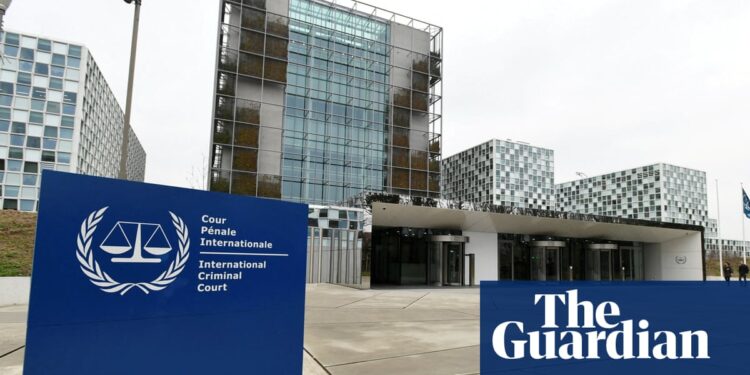The international criminal court (ICC) has condemned Donald Trump for imposing sanctions on its staff, which it said were intended to harm vital work to investigate the world’s gravest atrocities, including crimes against humanity and genocide.
The US president signed an executive order on Thursday authorising aggressive economic sanctions against the ICC and travel bans on its staff, accusing the body of “illegitimate and baseless actions” targeting the US and its ally Israel.
Trump’s order cited an ICC-issued arrest warrant for Benjamin Netanyahu for alleged war crimes relating to the Gaza war as a reason for the decision. Netanyahu visited Washington this week and praised Trump as Israel’s “greatest friend”.
Responding on Friday, the ICC called on its member states to stand up against sanctions, describing Washington’s move as an attempt to “harm its independent and impartial judicial work”.
It said: “The court stands firmly by its personnel and pledges to continue providing justice and hope to millions of innocent victims of atrocities across the world,” and it urged its 125 member states “to stand united” for justice and human rights.
World leaders and rights groups have rushed to defend the court. The German chancellor, Olaf Scholz, criticised the sanctions, which he said would “jeopardise an institution that is supposed to ensure that the dictators of this world cannot simply persecute people and start wars”.
The European Commission president, Ursula von der Leyen, said the ICC gave “a voice to victims worldwide” and it “must be able to freely pursue the fight against global impunity”.
In London, a spokesperson for the UK prime minister, Keir Starmer, said Britain supported the independence of the ICC and had no plans to place sanctions on its officials.
In Geneva, a United Nations rights body said Trump’s decision should be rescinded. “We deeply regret the individual sanctions announced yesterday against court personnel, and call for this measure to be reversed,” said Ravina Shamdasani, a spokesperson for the UN human rights office.
In his order, Trump said the ICC had “abused its power” by issuing the warrants for Netanyahu and his former defence minister Yoav Gallant, which he claimed “set a dangerous precedent” that endangered US citizens and its military personnel. Netanyahu strongly applauded Trump’s move, calling it bold.
The ICC was established in 2002 to prosecute serious crimes committed by individuals when member states are unwilling or unable to do so themselves. While the US and Israel are not parties to the statute, their citizens can fall under its jurisdiction. Israel has other allies such as the UK, Germany and France who would be obliged to arrest Netanyahu if he were to travel to those countries.
The warrants for Netanyahu and Gallant were approved by a three-judge panel elected by state parties, and the prosecutor has also investigated Palestinian militants including Hamas.
An arrest warrant has been issued for the Hamas military leader Mohammed Deif, whose whereabouts are unknown. In 2021, the ICC ruled that it had jurisdiction in Palestine and could investigate crimes there, despite Israeli objections.
It was unclear if the Trump administration would announce the names of specific individuals targeted by the sanctions. ICC officials have prepared for sanctions to affect senior figures at the court including its chief prosecutor, Karim Khan.
Amnesty International’s secretary general, Agnès Callamard, said the order “sends the message that Israel is above the law and the universal principles of international justice”.
She said on Thursday: “Today’s executive order is vindictive. It is aggressive. It is a brutal step that seeks to undermine and destroy what the international community has painstakingly constructed over decades, if not centuries: global rules that are applicable to everyone and aim to deliver justice for all.”
Other activists said imposing sanctions on court officials would have a chilling effect and run counter to US interests in other conflict zones where the court is investigating.
Charlie Hogle, a staff attorney with the American Civil Liberties Union’s national security project, said: “Victims of human rights abuses around the world turn to the international criminal court when they have nowhere else to go, and President Trump’s executive order will make it harder for them to find justice.
“The order also raises serious first amendment concerns because it puts people in the United States at risk of harsh penalties for helping the court identify and investigate atrocities committed anywhere, by anyone.”
After ICC judges issued the arrest warrants against Netanyahu and Gallant in November, the court braced itself for retaliatory moves by the incoming Trump administration. Officials at the court, which is headquartered in The Hague, fear the sanctions could pose an existential threat to the judicial body.
Several ICC sources told the Guardian last month that sanctions against senior court figures would be difficult but manageable, but institution-wide sanctions would pose an threat as they would block the court’s access to services on which it depends to function.
In 2020, under a separate but similar executive order, Trump imposed travel bans and asset freezes on the ICC’s former prosecutor Fatou Bensouda, who is Gambian, and one of her top officials.
The measures were launched in response to decisions made by Bensouda in war crimes investigations in Afghanistan and the occupied Palestinian territories. At the time, Bensouda was conducting a preliminary inquiry into allegations of crimes committed by Israel’s armed forces and Hamas.
In 2021, Bensouda upgraded the case to a formal criminal investigation. Khan inherited the inquiry and later accelerated it after the Hamas-led 7 October attacks and Israel’s ensuing destruction of Gaza.







